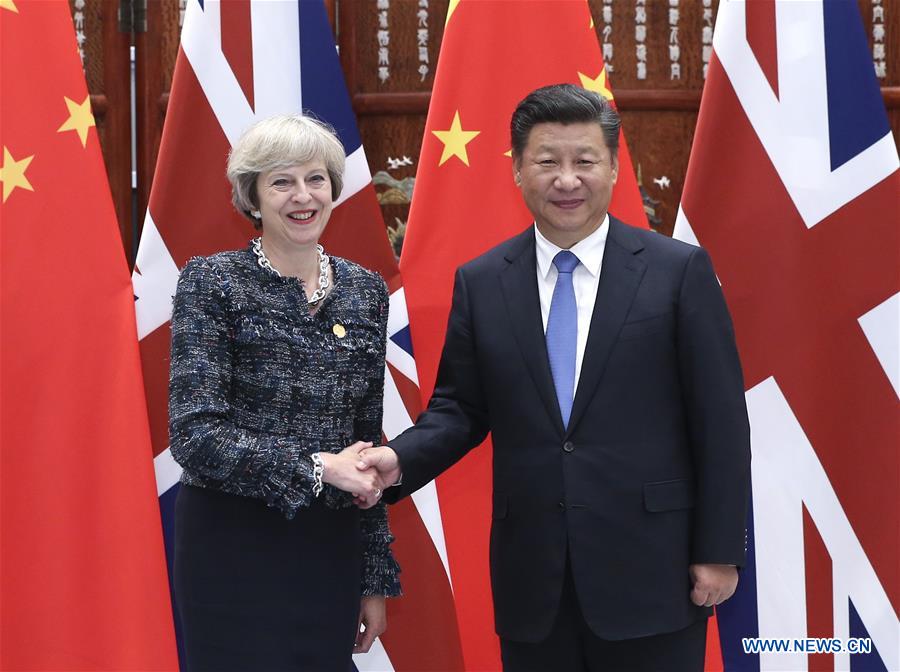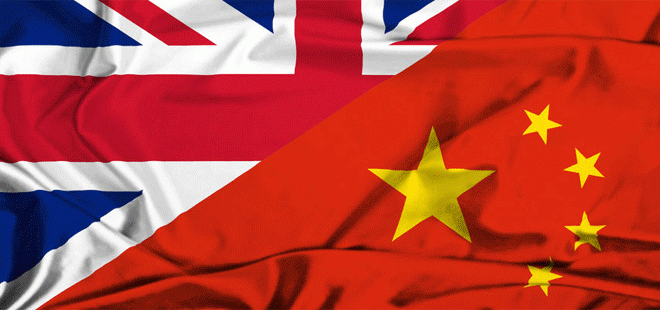


Chinese President Xi Jinping meets with British Prime Minister Theresa May, who is here to attend the Group of 20 (G20) summit, in Hangzhou, capital of east China's Zhejiang Province, Sept. 5, 2016. (Xinhua/Pang Xinglei)
As the looming prospect of Brexit dampens UK’s ties with its European partners, Prime Minister Theresa May’s upcoming visit to China has been hailed as a silver lining for the UK’s shrinking share of the Common Market, with many experts saying that Sino-UK trade will be high on agenda.
The three-day visit, which will kick off on Jan. 31, is expected to dovetail China and UK’s development strategies as well as enhance practical cooperation in finance, energy, infrastructure, food, advanced technologies, creative industry, and life sciences.
“May’s plan to visit China was postponed due to domestic issues including terrorist attacks and the slow progress of Brexit. Even so, she has managed to arrange her first visit to China in the beginning of 2018, right before the upcoming Spring Festival, a gesture that shows appreciation for and willingness to strengthen Sino-UK ties,” said Yu Jie, a senior research fellow at London School of Economics and Political Science.
Although May attended the G20 Summit held in China in September 2016, the approaching trip will be her first official visit to China since her inauguration as prime minister in 2016. May’s visit will boost the development of the “Golden Era” of Sino-UK bilateral ties, a term that was sealed by both nations during Chinese President Xi Jinping’s visit to the UK in 2015.
“Golden fruits have been yielded since the consensus of Golden Era was reached by both sides, whose leaders are expected to enrich the meaning of the ‘Golden Era’ and chart a new course for the future ties,” Liu Xiaoming, Chinese Ambassador to Britain, told Xinhua in January.
Post-Brexit rapprochement

[File photo]
Experts noted that both the UK and China are in an urgent need to improve bilateral ties, which can increase UK’s political leverage when dealing with its European counterparts regarding Brexit, as well as promoting China’s international influence and cooperation with the Western world.
“The UK now needs a diversified trade framework with nations outside of the European Union to maintain its advantages in global trade and finance, while China and UK’s mutual political reliance and complementary economies have laid a solid foundation for the two nations’ stable and long-term cooperation,” said Yu.
As China’s largest investment destination in Europe and the world’s second-largest offshore yuan center, Britain has attached great importance to opening up a new high growth market in China. According to statistics from China’s Ministry of Commerce, Sino-UK trade in 2017 rose 6.2 percent to $79.03 billion, with China’s exports to the UK up 1.8 percent, while its imports from the UK surged 19.4 percent, a number indicating Brexit’s negligible influence on the two nations’ trade ties. Meanwhile, UK investment in China reached $1.5 billion, and Chinese non-financial investment in Britain reached $1.53 billion.
The UK’s souring relations with the United States, its traditional partner, has also provided more opportunities for Sino-UK relations. In 2017, more than 1 million UK citizens signed an online petition calling for the cancellation of US President Trump’s state visit to Britain, while Trump himself canceled his visit to London through his Twitter account, which has irritated the British public.
Healthy Sino-UK ties are also beneficial for China, especially when the latter has been making great effort to boost its Belt and Road Initiative in the Western world, experts noted.
“As anti-globalization and protectionism have gradually gained ground, the UK’s regulated, reliable, and fair investment environment can benefit Chinese enterprises, helping them to strengthen their brand values, as well as conducting new international acquisition,” said Yu.
According to experts, unlike its European partners whose economic structure features industry, the UK is strong in finance, management, and consultation, elements that are crucial for China’s economic transition and expansion. The two nations’ cooperation will indirectly promote China’s ties with Central Europe and maybe even the whole Western world.
As a supporter of China’s Belt and Road Initiative, Britain can also use its advantages to help the initiative run smoothly in the Western world.
“May’s visit will also focus on the bilateral cooperation under the Belt and Road framework, as China’s advanced technologies, off-take potential, and abundant funds can work together with the UK’s professionalism in the financial and legal fields,” said Yu.
Britain was the first major Western country to apply to join the Asian Infrastructure Investment Bank, a multilateral financial institution founded to bring countries together to address the daunting infrastructure needs across Asia. It was also the second contributor after China to inject capital into the AIIB special fund, according to Xinhua.

 Award-winning photos show poverty reduction achievements in NE China's Jilin province
Award-winning photos show poverty reduction achievements in NE China's Jilin province People dance to greet advent of New Year in Ameiqituo Town, Guizhou
People dance to greet advent of New Year in Ameiqituo Town, Guizhou Fire brigade in Shanghai holds group wedding
Fire brigade in Shanghai holds group wedding Tourists enjoy ice sculptures in Datan Town, north China
Tourists enjoy ice sculptures in Datan Town, north China Sunset scenery of Dayan Pagoda in Xi'an
Sunset scenery of Dayan Pagoda in Xi'an Tourists have fun at scenic spot in Nanlong Town, NW China
Tourists have fun at scenic spot in Nanlong Town, NW China Harbin attracts tourists by making best use of ice in winter
Harbin attracts tourists by making best use of ice in winter In pics: FIS Alpine Ski Women's World Cup Slalom
In pics: FIS Alpine Ski Women's World Cup Slalom Black-necked cranes rest at reservoir in Lhunzhub County, Lhasa
Black-necked cranes rest at reservoir in Lhunzhub County, Lhasa China's FAST telescope will be available to foreign scientists in April
China's FAST telescope will be available to foreign scientists in April